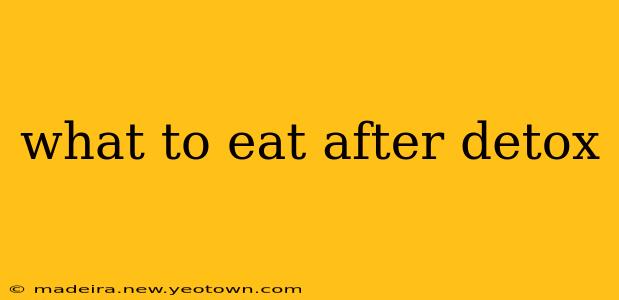What to Eat After a Detox: A Gentle Reintroduction to Nourishment
So, you've completed your detox! Congratulations! You've likely spent time cleansing your system, focusing on specific foods or eliminating others. Now comes the crucial next step: gently reintroducing nourishing foods back into your diet. Jumping back into your old eating habits too quickly can undo all your hard work and leave you feeling worse than before. This journey is about sustainable changes, not a quick fix.
This isn't just about what to eat; it's about how you reintroduce these foods. Think of it as a delicate dance, carefully stepping back into a world of flavour and nutrition.
What are the best foods to eat after a detox?
The ideal post-detox diet focuses on whole, unprocessed foods that support gut health and overall well-being. We're talking about foods packed with nutrients that help rebuild your system after the cleansing process.
Imagine this: your digestive system is like a garden that's been tilled and prepared. Now, you need to plant the right seeds to ensure a thriving harvest.
Prioritize these gentle giants:
- Bone broth: Rich in electrolytes and easily digestible, bone broth helps replenish essential minerals lost during the detox.
- Easily digestible fruits: Start with ripe bananas, avocados, and berries. These are gentle on the system and provide essential vitamins and minerals.
- Cooked vegetables: Steamed or lightly sauteed vegetables are easier to digest than raw ones. Think broccoli, carrots, sweet potatoes – packed with nutrients and fiber.
- Lean protein: Choose options like white fish, chicken breast, or lentils for easily digestible protein sources. Protein supports tissue repair and helps you feel full and satisfied.
- Fermented foods: Introduce small amounts of fermented foods like kefir or sauerkraut to support healthy gut bacteria. This can help improve digestion and overall well-being.
What should I avoid after a detox?
While you're rebuilding your system, it's wise to avoid certain foods that can potentially upset your stomach or interfere with the positive changes you've made.
- Processed foods: These are often packed with unhealthy additives and lack essential nutrients.
- Refined sugars and processed carbs: These can cause inflammation and energy crashes, undoing some of the benefits of your detox.
- Alcohol and caffeine: These can dehydrate you and irritate your digestive system.
- Dairy (potentially): Depending on your individual tolerance, dairy might be difficult to digest after a detox. Introduce it gradually if you choose to include it.
- Red meat: This can be harder to digest than leaner protein sources.
How should I reintroduce foods after a detox?
The key is gradual reintroduction. Don't rush back into your old eating habits!
- One food at a time: Introduce one new food every 2-3 days, paying close attention to how your body reacts.
- Listen to your body: If you experience any digestive upset, bloating, or other discomfort, stop eating that food and try a different one.
- Small portions: Start with small portions of each new food and gradually increase the amount as tolerated.
- Stay hydrated: Drink plenty of water, herbal tea, or bone broth to support your body's rehydration and detoxification processes.
What if I experience digestive issues after a detox?
Some discomfort is normal during the reintroduction phase, but persistent digestive issues warrant attention. If you experience persistent bloating, diarrhea, constipation, or other concerning symptoms, consult your doctor or a registered dietitian.
How long should I follow a post-detox diet?
There's no one-size-fits-all answer. It depends on the type of detox you underwent and your individual response. Ideally, aim for at least a week or two of focusing on whole, unprocessed foods to fully support your body's recovery and to solidify healthy eating habits.
Remember, the goal of a detox is not just short-term cleansing, but long-term health improvement. By following a thoughtful and gentle reintroduction plan, you can support your body's natural healing processes and lay the foundation for a healthier, more vibrant you.

